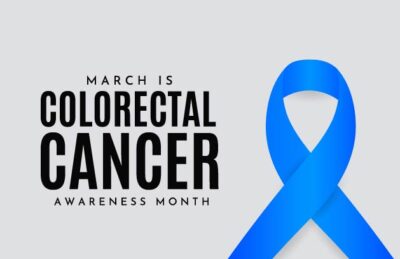March is Colorectal Cancer Awareness Month – 6 Prevention Tips
Colon cancer is one of the most preventable forms of cancer, thanks to colonoscopies, which can detect and remove small growths, called polyps, before they potentially become malignant. But did you know that a range of simple everyday practices can help prevent those polyps from ever even forming?
Because March is Colorectal Cancer Awareness Month, we’re using this blog to share some of those practices, beginning with why polyps form.
 Why Colon Polyps Pop Up
Why Colon Polyps Pop Up
A polyp is a little cluster of cells that can grow in various parts of your body, including the lining of the colon, or large intestine. They are believed to occur when your cells grow and divide more rapidly than they should, as the lining of your bowel is constantly renewing itself through cell regeneration.
Most polyps are harmless and do not present symptoms. However, over a number of years, the cells in some polyps could begin to mutate and become cancerous, if there are changes in your cell DNA that cause them to malfunction and grow abnormally. Symptoms of colon cancer include blood in the stool, changes in bowel movements, and abdominal pain.
Colon polyps are most likely to develop in people who are older than 50, who smoke, and who are overweight. Those with a history of colon cancer also are at higher risk of developing polyps.
Health conditions including inflammatory bowel disease (IBD) also can contribute to the risk of polyps forming, because chronic inflammation can cause continuous cell regeneration, increasing the risk of irregularities.
So, what can you do to help reduce your risk of colon cancer?
6 Good-Gut Practices for a Cancer-Free Colon
These good-health habits will prepare your digestive tract to protect against cell irregularities. Further, these everyday behaviors should improve how strong and alert you feel overall.
Eat more of the rainbow, but less red meat. An estimated 80% of colorectal cancer cases are attributed to what we eat, research has shown. Diets high in fruits, vegetables, and whole grains, and low in red and processed meats are likely to lower the risk of colorectal cancer. Processed meats include bacon, hot dogs, and lunch meats. Whole grains include oatmeal, brown rice, and quinoa. Aim for four to five servings of each fruits and vegetables a day – across all colors.
Mix in fermented foods. The makeup of your gut microbiome plays a substantial role in overall health and immune function, which includes cancer prevention. The higher the balance of healthy bacteria in the microbiome, the better, because they bind with and destroy potential carcinogens. Sauerkraut, yogurt, kimchee, and tempeh are among fermented foods that carry these probiotics. (For guidance, look for words such as Lactobacillus and Bifidobacterium.)
Move that bottom. Exercise stimulates blood flow and circulation, which can reduce the amount of time your colon is exposed to potential carcinogens via improved metabolism. Regular activity also can reduce your insulin levels, which is important because insulin is linked to tumor cell growth. Finally, exercise has been shown to ease inflammation, a contributor to colon cancer.
Say yes to water. Fluids help speed up the time it takes for waste to move through your intestines, meaning it also helps prevent constipation. This matters because constipation can significantly increase the risk of developing colon polyps, making the condition a risk for cancer. Some research suggests that water can significantly reduce the risk of colon cancer among women.
Say no to smokes. Extensive research concludes that many chemicals in tobacco smoke can cause cells to mutate and become cancerous, including in the colon. According to the American Cancer Society, long-term smokers are more likely not only to develop colorectal cancer, but also to die from it.
Think twice about a second cocktail. Alcohol, including wine and beer, is considered a carcinogen, so even moderate consumption has been linked to some colon cancer risk. The general guidelines for reducing risk is to limit alcohol consumption to two drinks a day for men, and one drink per day for women.
A Clean Colon Pays Off In Many Ways
Here’s another big benefit of a polyp-free colon: It could extend the number of years before your doctor prescribes a follow-up colonoscopy. A clean colon should only need a colonoscopy every 10 years, but if polyps are found, you might require one sooner.
If you’ve not had a colonoscopy yet, mark your calendar: It’s now advised that colorectal cancer screenings begin at the age of 45, unless you have risk factors that would require one sooner.
If you’re nervous about a getting a colonoscopy, this blog dispels many of the common myths of a colonoscopy. To learn more about how Cincinnati GI diagnoses colorectal cancer and your treatment options, visit our website, or contact Cincinnati GI.
